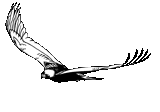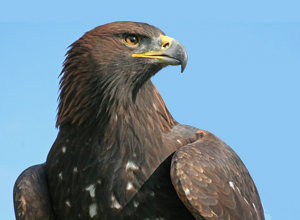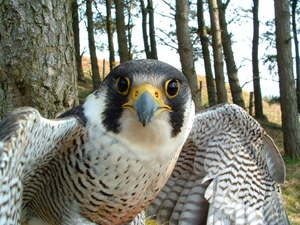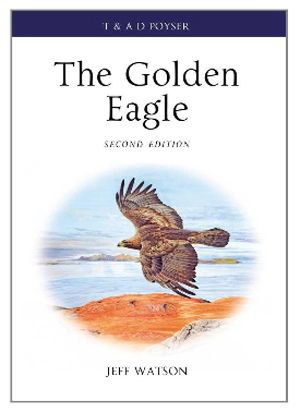
Scottish Raptor Study Group
Monitoring and conserving Scotland's birds of prey
Donald and Jeff Watson Raptor Award

In 2009 the Scottish Raptor Study Group established the Donald and Jeff Watson Raptor Award as a memorial to the contributions of both father and son to the study and conservation of raptors in Scotland. Donald Watson was born at Cranleigh in Surrey on 28 June 1918 of a Scots father and an English mother. He first began to draw birds before he was five years old and copied illustrations by Archibald Thorburn, the great wildlife artist of late Victorian and Edwardian times. Following the death of his father, his mother took her three sons to live in Edinburgh, where he attended Edinburgh Academy from 1932 to 1937. It was there that he came under the influence of George Waterston, a friendship which led to Donald becoming a founding member of the Scottish Ornithologists' Club in 1936. Following a degree in Modern History at Oxford and his war service, Donald was introduced to Arthur Duncan who invited him to live in Galloway and paint an ambitious series of paintings of birds in their habitats. In the spring of 1949, the Edinburgh art dealer, Ronnie Wheatley, gave him a critically acclaimed one-man exhibition. Others followed in London, Glasgow, Newcastle, Oxford, Dumfries and elsewhere. In 1950 he married Joan Moore, whom he had first met as a child in Surrey, and in 1951 they moved to settle in the beautiful upland village of St John's Town of Dalry in Galloway, where they raised their four children and lived happily for the rest of their lives.

Although birds in their landscapes became his trademark, Donald continued to paint portraits, and in 1962 he began his long series of bird illustrations with the Oxford Book of British Birds (OUP), which involved him painting a total of 96 colour plates, one every week for two years. Indeed, Donald was to go on and illustrate over thirty other books, perhaps most notably those in the prestigious Poyser series, where he collaborated with his friends Desmond and Maimie Nethersole-Thompson on Greenshanks (1979) and Waders (1986), with his friend Derek Ratcliffe on The Peregrine Falcon (1980), and of course he provided the frontispiece for son Jeff's book The Golden Eagle (1997) a wonderfully fresh painting of a pair of golden eagles over Ardnamurchan. Undoubtedly, the species that he was most associated with was his beloved hen harrier, one of the most beautiful and artistically pleasing of all our birds, yet the most persecuted because of its ability to take red grouse. Donald meticulously studied and recorded the breeding, hunting and roosting habits of the former in a pioneering way, and his book on the hen harrier is a classic marriage of bird study and art that stimulated a generation of field ornithologists and bird artists. Donald Watson died at Dumfries on 7 November 2005, after a short illness. He was buried at St John's Town of Dalry, Galloway.

His son, Jeff Watson, developed under his father's tutelage in Galloway before graduating in zoology at Aberdeen University. Moving to the Seychelles, he spent four years researching the endemic Seychelles Kestrel, for which he was awarded a doctorate. Following this, he worked for the WWF on the conservation of various endangered land birds in the Seychelles; research he continued through field visits and active collaboration with conservation groups on the islands. On return from the Seychelles, Jeff worked for a short time with the Scottish Wildlife Trust before joining the Nature Conservancy Council to lead a major research project on land use change and impacts on golden eagles. This became a pioneering study of golden eagles in nine ecological regions, which set the highest of standards for understanding the effects of grazing, persecution, afforestation and disturbance on raptors. Jeff's work on golden eagles resulted in many scientific papers, and in 1997 the book The Golden Eagle was published by Poyser/Academic Press. This masterpiece of a book was the first monograph produced in large format in this prestigious series, and has been lauded throughout the world. Whilst engaged in this research, Jeff also, since April 1997, served as a Director on the Management Team of Scottish Natural Heritage in north Scotland. He had lead responsibility for the Natura programme (the designation, conservation and management of Special Protection Areas and Special Areas of Conservation), the National Nature Reserve series, and the Site Condition Monitoring Programme. The network of SPAs for raptors in Scotland is an especially fine legacy, where SNH worked closely with the Scottish Raptor Study Groups and RSPB to make the case for these protected areas, and for which Jeff must take particular credit. Jeff died in September 2007 following a brave fight against cancer; during his final months he worked hard to complete a second edition of his monograph which described many of the most recent findings on Golden Eagles including the internationally important work on a conservation framework. Sadly he did not complete this, but friends and colleagues worked hard to ensure that it was eventually published in 2010.
Chris Rollie
The Scottish Raptor Study Group devised this award in recognition of 'a significant long-term amateur contribution to the study of raptors in Scotland'. Find out about previous winners:
2015 Ian Miller & Peter McHugh (joint winners)